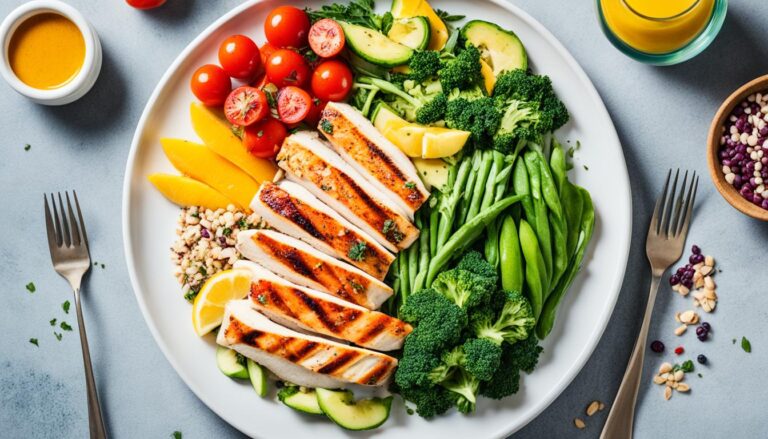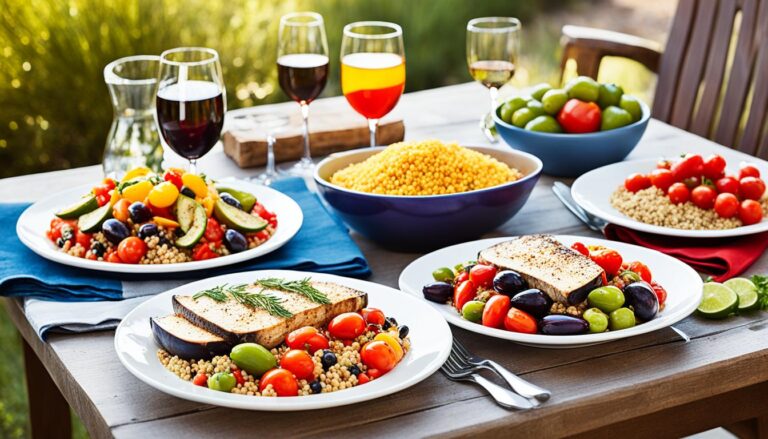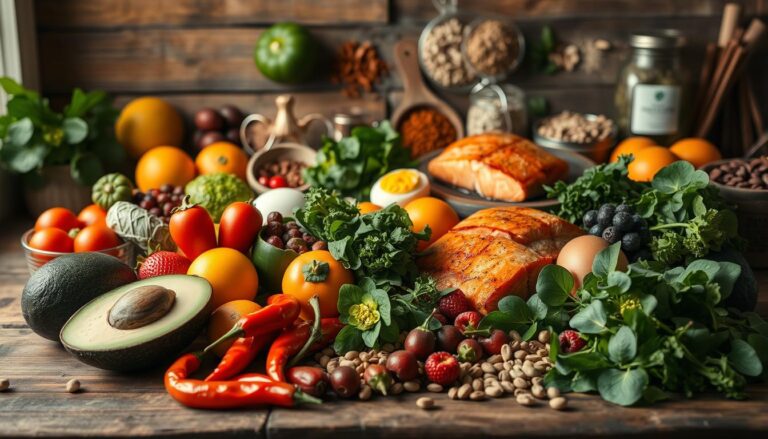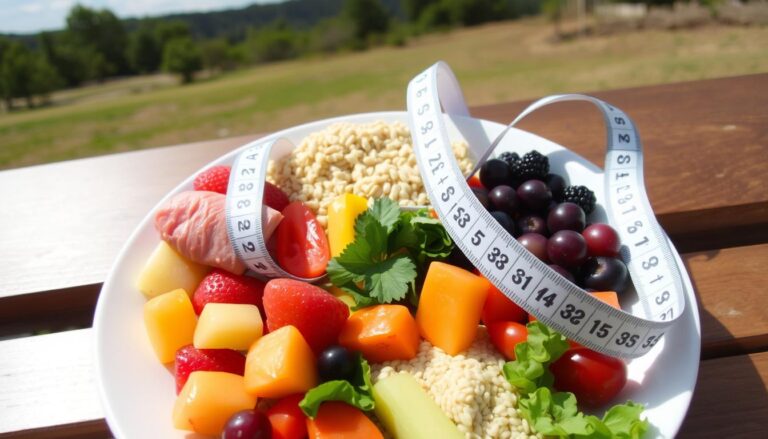Are you looking to boost your nutrition? The key is protein, essential for muscles and a healthy life. But with many choices, picking the best can be tough.
Join us as we explore the top protein rich foods to enhance your diet and fitness journey.
Key Takeaways
- Explore the diverse world of protein sources, from lean meats to plant-based powerhouses
- Discover the role of protein in maintaining a healthy lifestyle, from muscle growth to recovery
- Uncover the nutritional benefits of lean cuts of meat, eggs, dairy, and seafood
- Dive into the plant-based protein options, including legumes, nuts, and seeds
- Learn how to incorporate the best protein sources into your diet for optimal results
Unveiling the World of Protein Power
Protein is key to a healthy life. It helps our cells work right and is vital for muscle growth and recovery. Knowing how protein works can make you feel more alive and full of energy.
Demystifying Protein’s Role in a Healthy Lifestyle
Protein does more than just help muscles grow. It’s a nutrient that supports your overall health. It helps fix and keep tissues strong and boosts your immune system. Adding the right amount of protein to your diet can make you healthier, help muscles grow, and lower the risk of diseases.
Protein’s Impact on Muscle Growth and Recovery
For those into fitness and sports, protein is crucial. It helps fix and grow muscle fibers. This means you get stronger, last longer, and heal faster. By knowing how protein affects muscles, you can eat right to meet your fitness goals.
Protein is the building block of life, and its role in maintaining a healthy, active lifestyle cannot be overstated.
Want to get healthier, perform better, or just eat right? Understanding protein’s role is key. By using protein wisely, you can live a more active, happy, and rewarding life.
Lean Meats Protein Powerhouses
Lean meats are key for a protein-rich diet. Chicken and beef are great examples. They provide lots of nutrition to help your body and fitness goals.
Exploring the Lean Cuts From Chicken to Beef
Chicken and turkey are known for their high protein and low fat. These lean meats are very versatile. They can be cooked in many ways and taste great. Lean beef cuts like sirloin and round are also good for protein. They fit well in a balanced diet.
When picking lean meats, choose the leanest you can find. Go for cuts with little fat. Cooking them grilled, baked, or roasted helps keep the nutrients and cuts down on calories.

Incorporating lean meats into your diet is an excellent way to fuel your body with high-quality protein and essential nutrients.
By choosing and preparing lean meats wisely, you can get lots of protein and stay healthy. Try different types of poultry beef, and other protein-rich meats. Find what you like best and make lean protein a big part of your meals.
The Plant Based Protein Patrol
The plant kingdom is full of protein powerhouses. From legumes to nuts, there are many options to nourish our bodies. These plant-based superstars are great for vegans flexitarians or anyone looking to add variety to their diet.
Legumes like beans, lentils, and chickpeas are packed with protein and fiber. They support health with minerals and complex carbs. Nuts and seeds are great snacks that can be added to many dishes.
- Lentils: Packed with up to 18 grams of protein per cooked cup, these versatile legumes are a pantry staple for plant-based protein enthusiasts.
- Almonds: A handful of these nutrient-dense nuts provides nearly 6 grams of protein, along with a generous dose of healthy fats and fiber.
- Chia Seeds: Tiny but mighty, these superfood seeds contain approximately 4 grams of protein per tablespoon, making them a fantastic addition to smoothies, yogurt, and baked goods.
Plant-based proteins are versatile. You can make a lentil stew, snack on roasted chickpeas, or blend a protein-packed smoothie with nut butter. By joining the plant-based protein patrol, you can enjoy delicious and nutritious options.
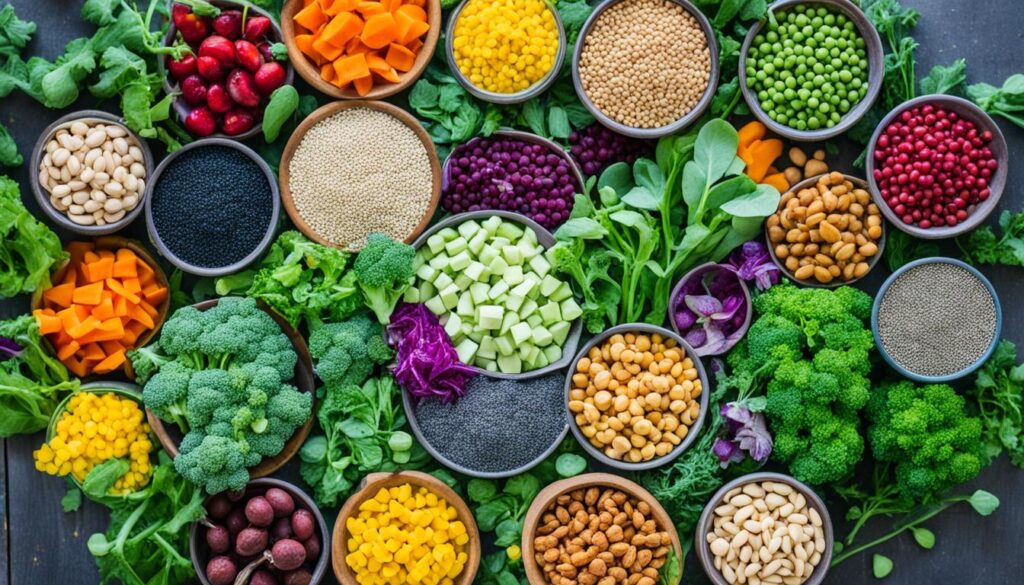
Legumes, nuts, and seeds are the unsung heroes of the plant-based protein world. They offer a diverse array of flavors, textures, and nutritional benefits to keep your body thriving.
Eggs traordinary Sources of Protein
Eggs are a top choice for protein-rich foods. They are versatile and full of nutrients. Eggs are great for muscle growth, repair, and recovery.
Cracking Open the Nutritional Goodness of Eggs
Eggs are packed with protein. A large egg has about 6 grams of it. They also have vitamins and minerals like vitamin A, vitamin D, vitamin B12, and choline.
Eggs are versatile. You can enjoy them scrambled, fried, poached, or in quiches and frittatas. They are affordable and easy to make, perfect for any meal.
Eggs are one of nature’s most nutrient-dense foods, providing a wide range of essential vitamins, minerals, and high-quality protein.
Adding eggs to your meals is easy and beneficial. It helps increase your protein intake and supports your health. Eggs are great for muscle building and managing weight.

Dairy Delights: Protein-Packed Pleasures
Discover the power of protein-rich dairy products to boost your diet. The dairy aisle is full of nutritional wonders, from creamy milk to tangy yogurt. Let’s explore how to add these protein-packed foods to your daily meals.
Milk is a key dairy product, packed with protein. A single cup gives you up to 8 grams of protein. It’s a great way to increase your protein intake. You can choose from regular, low-fat, or plant-based milk to fit your needs.
Yogurt is another great dairy option, full of protein. Greek yogurt is known for its creamy texture and high protein levels. You can enjoy it on its own, in smoothies, or as a dessert.
Cheese is also a top source of protein. Whether you like soft or sharp cheese, it’s a tasty way to get more protein. Add it to sandwiches, melt it on dishes, or enjoy it as a snack.
Embrace the world of dairy delights for a boost of protein. From a simple glass of milk to a variety of cheese options, the dairy aisle has it all. These protein-rich foods can take your diet to new heights.
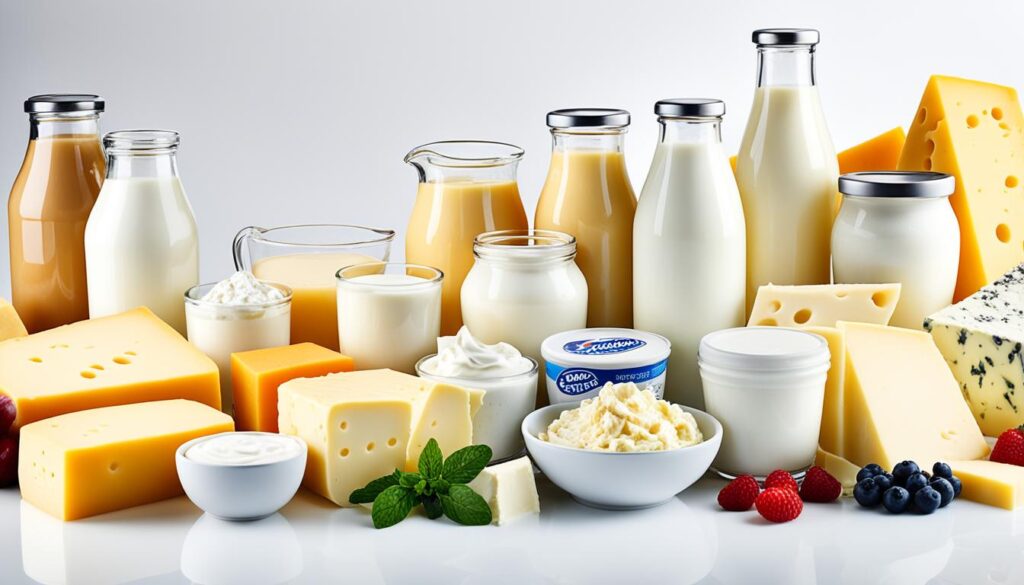
The best types of protein you can eat
Nature gives us many high-quality protein options. You can choose from lean meats, seafood, plant-based foods, and dairy products. Let’s explore the best proteins for your daily meals.
Unveiling Nature’s Protein Treasures
Protein is key for a healthy life. It helps with muscle growth, recovery, and overall health. A balanced protein-rich diet is essential. Let’s look at the high-protein foods nature offers:
- Lean Meats: Chicken, turkey, and lean beef and pork are great sources of complete proteins. They give your body all the amino acids it needs.
- Seafood: Fish like salmon, tuna, and tilapia are full of high-quality protein. They also have many health benefits.
- Plant-Based Protein: Legumes, nuts, seeds, and soy products like tofu and tempeh are excellent vegetarian protein sources. They fit well into a protein-rich diet.
- Dairy Products: Yogurt, cheese, and milk are dairy-based protein powerhouses. They have a complete amino acid profile.
- Eggs: Eggs are a high-protein food and a great choice. They are versatile and easy to get.
Knowing about the different protein sources helps you make a balanced, high-protein diet. This suits your taste and dietary needs.
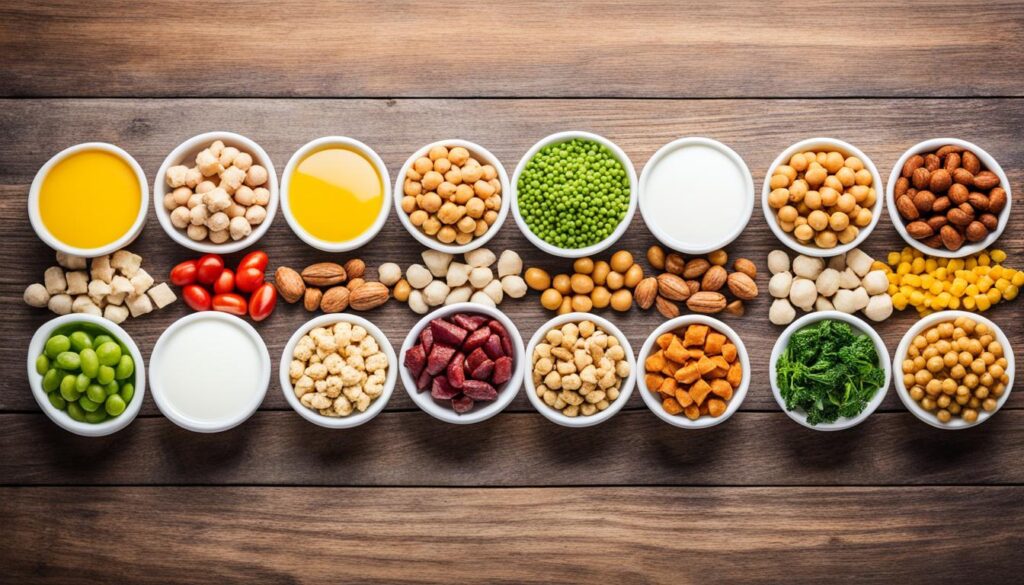
| Protein Source | Protein Content per serving | Additional Benefits |
|---|---|---|
| Chicken Breast | 54g 6 oz | Lean, low in fat, versatile |
| Salmon | 34g 6 oz | Rich in omega-3 fatty acids |
| Lentils | 18g 1 cup | High in fiber, iron, and other nutrients |
| Greek Yogurt | 23g 1 cup | Probiotics for gut health |
| Almonds | 6g 1 oz | Good source of healthy fats and minerals |
When it comes to building a protein-rich diet, nature offers a bountiful selection of high-quality options.
Adding a variety of high-protein foods to your meals ensures you get all the amino acids your body needs. Whether you like animal or plant-based protein sources, there are many tasty and healthy choices.
Fishing for Protein Oceanic Wonders
Dive into the world of protein-rich seafood and discover the ocean’s bounty. From tuna to salmon, the seafood aisle is full of nutritional delights. These foods can boost your protein intake and power your day.
From Tuna to Salmon: Navigating the Seafood Aisle
Tuna is a powerhouse of protein, with 26 grams per 3.5-ounce serving. It comes in various forms, from canned to sashimi-grade. Add it to your meals for a protein boost.
Salmon is another protein-rich seafood. It’s packed with omega-3 fatty acids and has 22 grams of protein per 3.5-ounce serving. You can grill, bake, or enjoy it raw in sushi.
| Seafood | Protein g per 3.5 oz | Omega-3s mg per 3.5 oz |
|---|---|---|
| Tuna | 26 | 556 |
| Salmon | 22 | 2,260 |
| Cod | 19 | 178 |
| Shrimp | 24 | 0 |
Seafood is versatile and packed with protein. Try the mild cod or the succulent shrimp. Each offers a unique nutritional profile for your balanced diet.
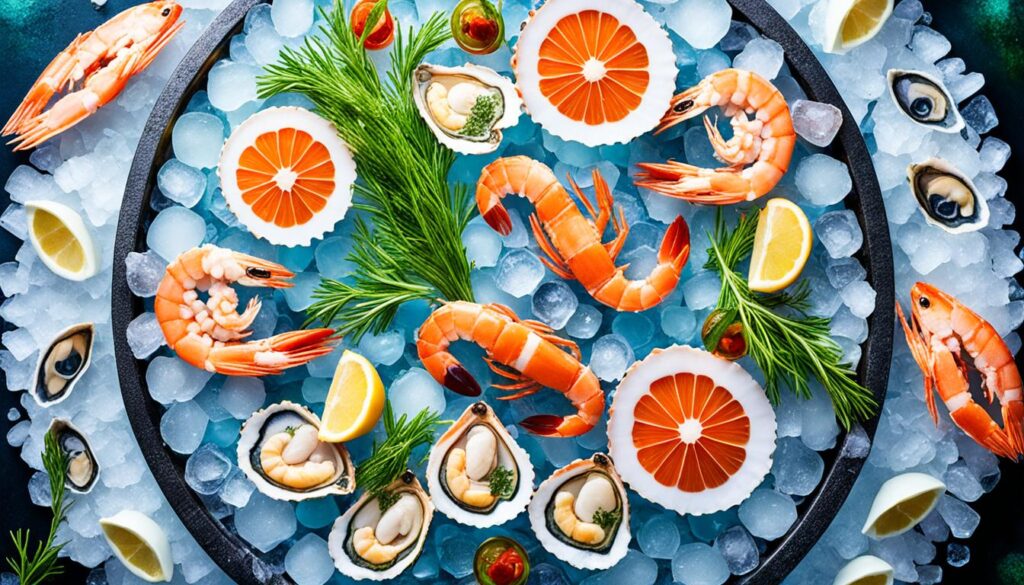
Seafood is the ultimate protein-packed powerhouse, brimming with essential nutrients and versatile enough to elevate any meal.
Legumes The Protein Packed Plant Pals
Protein is key for a healthy diet. Many think of protein as coming from animals, but plants have a lot too. Legumes are a great source of protein from plants.
Exploring Beans Lentils and Peas Nature’s Protein Bounty
Beans, lentils, and peas are in the legume family. They are full of proteins. These legumes are cheap and easy to find. They also give you a lot of nutrition. Eating just one cup of lentils or peas can give you up to 15 grams of protein.
Legumes are not only high in protein but also in fiber, vitamins, and minerals. They are a great choice for anyone wanting more plant-based protein. You can add them to many dishes like bean chili, lentil soup, or pea salad.
| Legume | Protein per Cup Cooked | Fiber per Cup Cooked |
|---|---|---|
| Lentils | 15g | 16g |
| Black Beans | 14g | 15g |
| Chickpeas | 12g | 12g |
| Split Peas | 16g | 16g |
Adding legumes to your meals is a great way to get more plant-based protein. You can use them in soups stews, salads, and side dishes. These protein packed plant pals offer endless possibilities.
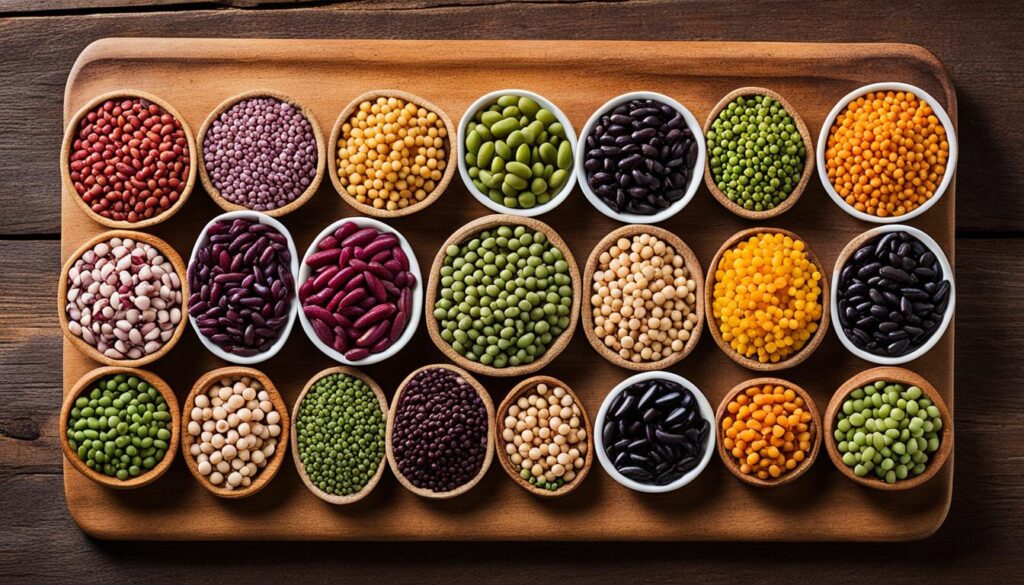
Legumes are the unsung heroes of the plant-based protein world. They’re affordable, versatile, and packed with nutrients that nourish the body and soul.
Nutty for Protein
Nuts and seeds are often not thought of as protein sources, but they are packed with nutrients. They are great for those looking to increase their protein intake. These foods are tasty and easy to add to your meals.
Uncovering the Protein Power of Nuts and Seeds
Almonds and walnuts are crunchy and full of protein. Chia and flaxseeds are small but powerful. These foods are not just for protein they also have healthy fats, fiber, and vitamins.
Almonds, cashews, and pistachios are great for plant-based proteins. They give you about 6-7 grams of protein per serving. Chia seeds, flaxseeds, and hemp seeds are even better, with up to 5 grams of protein per tablespoon.
- Almonds: 6 grams of protein per 1/4 cup
- Walnuts: 4 grams of protein per 1/4 cup
- Chia seeds: 5 grams of protein per tablespoon
- Flaxseeds: 5 grams of protein per tablespoon
Nuts and seeds can be added to many dishes, like smoothies, salads, baked goods, and energy bars. They are perfect for fueling workouts, helping with muscle recovery, or just adding more protein-rich nuts and seeds to your meals. They are a tasty and healthy choice.
Nuts and seeds are a convenient and satisfying way to boost your protein intake and support a balanced, healthy lifestyle.
Protein Supplements Boosting Your Intake
Protein supplements are a top choice for those looking to increase their protein intake. They come in many forms like powders, shakes, and bars. Each type meets different dietary needs and tastes.
Adding protein supplements to a balanced diet can be helpful. They make it easy to get enough protein. If you want to build muscle, recover, or just stay healthy, knowing about these supplements can guide your choices.
The Protein Supplement Spectrum
There are many protein supplements available, each with its own benefits. You can find whey, casein, soy, pea, and hemp proteins. Each one has its own nutritional value and suits different fitness and health goals.
Navigating the Supplement Aisle
Choosing the right protein powder or protein bar is important. Think about your diet, what you like, and your fitness goals. Talking to a health expert or nutritionist can help pick the best protein shake or supplement for you.
| Protein Supplement Type | Key Features | Recommended Uses |
|---|---|---|
| Whey Protein | Rapidly absorbed, rich in branched-chain amino acids BCAAs | Muscle building, recovery, and post-workout replenishment |
| Casein Protein | Slow-digesting, provides sustained release of amino acids | Muscle preservation, overnight recovery, and meal replacement |
| Plant-Based Protein | Derived from sources like soy, pea, or hemp, suitable for vegetarians and vegans | Overall health and wellness, muscle support, and dietary diversity |
Choosing your favorite protein supplement is key. Make sure it fits well with a balanced diet. This way, you can fully benefit from these supplements in your health and fitness journey.
Conclusion
Our journey through the world of protein-rich foods shows us the importance of a balanced diet. Lean meats and plant-based foods offer many healthy protein choices. These options are great for muscle building and meeting dietary needs.
Looking to lose weight, support an active life, or stay strong? Adding different protein sources to your meals is key. Try eggs, dairy, seafood, and legumes for their unique nutrients.
Finding the right protein sources is personal. Try new foods and see what works for you. Enjoy the variety of protein-rich foods and benefit from a well-rounded diet.

